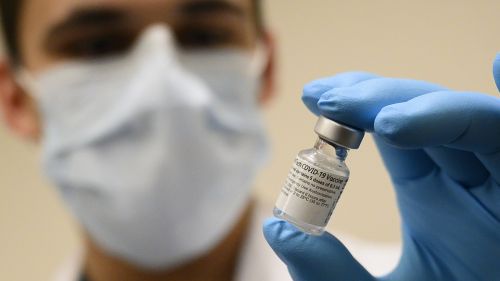COVID-19 Vaccine Availability Grows While Global Public Opinion Shows Continued Concern

Even as the vaccine rollout continues, some nations consider greater restrictions and further lockdowns as case numbers increase.
This week the world passed the 103.9 million case mark, with over 2.2 million deaths attributed to COVID-19. Cases have begun to decline worldwide, though there are still hotspots in various countries around the world. In part, more reactive policies have allowed nations to implement greater restrictions before outbreaks worsen.
The Council survey team is providing updates every other week on public opinion around the world on the COVID-19 pandemic. This week, the Chicago Council Survey team’s update includes polling results from the United States, Japan, South Korea, North Korea, France, the United Kingdom, Hong Kong, and Indonesia.
Key Findings
- Six in ten Americans (60%) say they are very or somewhat likely to get a vaccine as soon as it’s available to them—or have already gotten a shot.
- Although the French government has decided to implement stricter measures to contain the virus while avoiding another lockdown, almost two-thirds of French people (62%) are in favor of a new lockdown.
- The rate of cases in the United Kingdom has been consistently falling for three weeks, but as more than a third of Britons (37%) say they are only mostly following the rules and about half (51%) have been meeting people outside of their household, the risk of a new wave looms.
- In Hong Kong, even as cases remain relatively low, nearly three-quarters of residents (71%) say they are dissatisfied with the government’s response to COVID-19.
- Even as hospital beds in Indonesian cities reach full capacity, 64 percent of Indonesians say the government has done well in handling the virus, and 65 percent have signaled their willingness to take the vaccine.
The United States
26.4 million cases, 446,643 deaths
The US vaccine campaign is beginning to pick up. To date, over 33 million doses have been administered nationwide, and just over six million Americans have gotten the full, two-dose course of vaccine. The Biden administration’s announced goal of 100 million shots in the first hundred days seems on track, with the US currently administering an average of 1.3 million shots a day.
With the effort going on in every state and territory simultaneously, many Americans know someone who has received a vaccine. Axios/Ipsos polling from January 29-February 1 finds that 68 percent of Americans know someone who has gotten a dose of vaccine—including 13 percent of survey respondents themselves.
Vaccinating hundreds of millions of Americans with a two-dose vaccine regimen during a pandemic is a major undertaking, requiring a massive production effort, logistical arrangements across the country to get vaccines to providers, and public health information campaigns to ensure that the public trusts the vaccine.
At this point, the immediate problem is providing enough vaccine doses for the tens of millions of Americans who want one. As the vaccines came closer to release, and now that they are in use, the proportion of Americans who say they are likely to get a first-generation COVID-19 vaccine has steadily risen. Today, six in ten Americans say they are very or somewhat likely to get a vaccine as soon as it’s available—or have already gotten a shot.
But vaccine hesitancy will be an issue in getting to true herd immunity levels. As Kaiser Family Foundation data shows, Americans living in rural areas are among the most vaccine hesitant groups, along with Republicans and African-Americans. Part of the issue is that rural residents are less worried about getting sick from the coronavirus, with half saying the seriousness is generally exaggerated (50%), and six in ten see vaccination as a personal choice (62%) rather than part of everyone’s responsibility to protect others (36%). Reaching these Americans will require targeted outreach, likely through local doctors and health care providers, sources that rural residents trust more (86%) than national agencies like the Federal Drug Administration (68%) or the Center for Disease Control (66%).
Americans don’t expect to return to their normal lives soon, and Axios/Ipsos polling finds that most Americans believe returning to their pre-COVID life would be a large (39%) or moderate (32%) risk to their health and well-being. But a majority of the public believes that they will be able to return to something like normal within the next year, or possibly sooner. Much of that will depend on how the vaccine rollout goes over the coming months, and whether vaccine-hesitant Americans embrace it or not.
Japan
392,361 cases, 5,917 deaths
Japan remains in the grips of a wave of coronavirus cases and though cases are starting to decline, Prime Minister Suga’s approval rating continues to fall. In Nikkei polling conducted January 29-31, half (50%) say they do not support the Suga cabinet, and 61 percent give the government negative marks for its coronavirus response. One key factor likely on the minds of Japanese: the state of emergency declaration, which eight in ten (79%) say came too late. Nearly all Japanese say that the existing state of emergency should be extended, though the public is divided over whether it should be extended everywhere or just in some locales (45% each). And in line with that public sentiment, the government has extended the state of emergency through March 7 in ten prefectures, including Tokyo, Osaka, and Kyoto.
One major problem Japan faces in dealing with the pandemic is a shortage of hospital beds for COVID-19 patients. This latest wave, though small by comparison to the massive numbers of cases seen in the United States and Europe, has strained Japanese hospitals, resulting in some hospitals 70% full of COVID-19 patients. However, this isn’t because Japan lacks beds. Instead, the strain is caused by a combination of factors. For one, not all hospitals in Japan treat COVID patients, putting a greater burden on those that do. Japan also fewer doctors per person, and per hospital bed, than other major countries. And perhaps most significantly, Japanese patients with COVID-19 remain in the hospital even once their symptoms are no longer serious.
As Japan’s coronavirus situation has worsened in recent months, public support for holding the Tokyo Olympic and Paralympic Games, already postponed from the summer of 2020, has declined. In October, Asahi polling found four in ten Japanese in favor of holding the Games in the summer of 2021; today, only 11 percent say the same. Instead, a half (51%) favor a second postponement. The public is similarly skeptical that the Games will go ahead as scheduled. Nikkei polls find only fifteen percent believe they will go on as planned given the current state of the pandemic. Instead, a plurality (45%) say that if the pandemic continues as is, cancelation would be unavoidable, with another third (36%) saying the same about a second postponement. Tokyo 2020 chief Yoshiro Mori, however, remains firm, saying that the games will “certainly go ahead however the (pandemic) evolves.” While that position may not have a large following among the public, it has at least one fan in the US Senate: Utah senator and former CEO of the 2002 Olympic Games Mitt Romney. As the Senator commented last week, “[t]he world awaits the inspiration of great competition and global sportsmanship.”
South Korea
79,311 cases, 1,441 deaths
South Korea reported 336 new COVID-19 cases on February 2. The country is just bringing its most recent surge under control even though overall cases at their height remained relatively low compared to other countries. New cases are due to outbreaks in churches and the arrival of mutations from the United Kingdom, South Africa, and Brazil.
In December, South Korea obtained 56 million vaccine doses, purchasing 10 million doses from AstraZeneca and Pfizer, 20 million from Moderna, 6 million from Janssen, and 10 million from COVAX. Vaccine rollouts will begin February. The South Korean government hopes to achieve herd immunity by November, although there is skepticism that this timeline can be met.
A survey by the Word Economic Forum and IPSOS conducted December 17-20 found that 75 percent of South Koreans wanted vaccines sooner. The same poll also found that 80 percent of South Koreans were concerned about thew safety of vaccines—the highest of any country included in the survey.
North Korea
Unknown cases and deaths
There is no publicly available data on COVID-19 cases in North Korea, but North Korea claims there are zero cases in the country. That claim may be hard to believe, but with virtually no advanced medical care outside of the capital of Pyongyang, even if there are cases, they are unlikely to be confirmed. North Korea closed its borders in January 2020 and has stringent restrictions in place. South Korean intelligence claimed that one North Korean official who violated those restrictions was executed.
Getting vaccines into North Korea could be a vital step in containing any potential outbreaks. However, it is unclear if North Korea would accept vaccines from the outside world. The South Korean government has said it is willing to share vaccines with North Korea. North Korea has yet to respond to the offer but is unlikely to accept for a variety of reasons.
Another potential source for vaccines is China. The two countries are long-time allies and China has produced its own.
But the most surprising source may be domestic. According to Daily NK, North Korea is currently in Phase 3 clinical trials of its domestically produced vaccine. According to the report, the vaccine was developed based on knowledge gathered through “hacking activities.” The efficacy of these vaccines will likely remain a mystery and any claims will be viewed with considerable doubt.
France
3.2 million cases, 77,238 deaths
As cases begin to rise just a month and a half after France exited their second national lockdown, French Prime Minister Jean Castex announced new restrictions on January 29, though a third lockdown is not out of the question. Among the new measures are the closure of the borders to countries outside of the European Union, the closure of large commercial spaces, increased support for teleworking, and greater monitoring of curfew compliance.
Despite this effort to avoid a third lockdown, nearly two-thirds of French citizens (62%) are in favor of a new lockdown in order to limit the COVID-19 pandemic, according to a January 27-28 Odoxa poll. Even more French people believe that if the government decides to impose another lockdown, it should be put in place as quickly as possible (70%) rather than delaying it as much as possible (29%).
Although many are in agreement about the need for a new confinement, there are differing preferences about the specific measures that may be implemented. When asked whether there should be a restriction on movement outside of their home for more than one hour per day, 48 percent are in favor while 52 percent are opposed. And, when asked whether the closure of bars, restaurants, and cultural institutions should be prolonged, 46 percent are in favor while 54 percent are opposed. However, there is more agreement around the closure of schools (60% opposed) and the closure of non-essential businesses (64%).
Meanwhile, the National Institute of Statistics and Economic Studies in France (INSEE) has estimated that the French GDP fell 8.3 percent. While this is the largest drop since the second world war, it was not as bad the 9 percent drop that analysts had initially suggested. Nonetheless, a debate has begun about how to deal with the now €400 billion in “COVID debt” that France has incurred. According to a January 6-7 Odoxa poll, 39 percent of French citizens believe it should be reimbursed with a large contribution coming from the wealthiest French citizens. Another 30 percent say that it should be reimbursed, but on a much longer timeline than typical debt repayments. But, a third of French people say that is simply unnecessary to repay these €400 billion.
The United Kingdom
3.8 million cases, 108,013 deaths
On January 26, the United Kingdom passed the grim milestone of 100,000 dead from COVID-19. The rate of deaths remains elevated, but recent efforts to stem the spread have caused the rate of cases to decline for the past three weeks. But, the detection of the virus variant first discovered in South Africa has appeared in the United Kingdom, and the health secretary Matt Hancock has said that the country must “come down hard” on the variant to prevent a new outbreak.
However, beyond the risk of this new variant, certain activities among the public raise the possibility of a new wave. A January 25 Redfield and Wilton survey found that more than a third of British people (37%) report that they have only ‘mostly’ followed the current government restrictions. Additionally, about half of British respondents (51%) say that they have seen one or more person from outside of their household: an activity that is, in most cases, prohibited at this time. And, among those who did see people from outside of their household, just half (51%) reported staying at a distance the whole time and a quarter (25%) said they came into physical contact with the other person.
But the risk may extend beyond these Britons’ communities. When asked in a separate Redfield and Wilton poll from January 20 whether they intended to travel on holiday this summer, 45 percent indicated that they do plan to travel domestically, internationally, or both. This proportion represents an increase of 8 percentage points from June 2020 when just 37 percent said they planned to travel domestically or abroad.
Notwithstanding the present risks to Britons, a positive aspect of the United Kingdom’s situation is their successful vaccination campaign>. So far, the United Kingdom has given 9.5 million doses, accounting for around 14 percent of their population. Proportionally, this is the fourth highest rate in the world behind Israel, Seychelles, and the United Arab Emirates.
For Britons, there are disagreements over who should be the first to receive the vaccine once NHS staff, care home residents and workers, and older people over the age of 70 have been inoculated. According to an Ipsos MORI poll from January 22-25, 46 percent of people believe that teachers and nursery workers should be the first priority, while other emergency service workers came in second at 42%. Following these groups were police officers (35%), staff working in supermarkets and food shops (33%), and people aged 60 to 69 (31%).
Hong Kong
10,530 cases, 184 deaths
The COVID-19 situation in Hong Kong has remained moderate over the past year. During its largest outbreak in July and August, the daily increase in cases peaked at 132, in a city of around eight million residents. However, local transmission of COVID-19 was never fully terminated in Hong Kong, despite considerable government actions, which included a campaign to test the entire population in September.
Currently, Hong Kong is in the midst of a new wave of COVID-19 transmission. In the past two weeks, the Hong Kong government started to adopt an "ambush-style” lockdown, sealing off neighborhoods linked to COVID-19 infections until all residents have been tested for the virus. On January 23, a heavily populated area of nearly 500,000 sq ft was locked down for two days, with 13 new COVID-19 cases detected after more than 7,000 residents were screened. Some health experts questioned the effectiveness of the lockdown, citing the high cost and low positivity rate.
According to a survey conducted by Hong Kong Public Opinion Research Institute from January 18-25, seven in ten Hong Kong residents (71%) say they are dissatisfied with the government’s response to COVID-19 and only a small portion (16%) say they are satisfied.
The Hong Kong government does not plan to start vaccinating its population until February. In a survey conducted by Hong Kong Public Opinion Research Institute from January 8-17 less than a third of respondents (31%) say they will participate in the vaccination program, while another 36 percent say they remain undecided. According to the study, efficacy of the vaccine and its potentially adverse side effects are the biggest concerns. Another survey conducted by Hong Kong University from January 6-17 finds that more than half (54%) of the respondents do not intend to get vaccinated, down from November when 63 percent said the same.
Indonesia
1.1 million cases, 30,770 deaths
On January 26, positive cases of COVID-19 in Indonesia exceeded one million as the occupancy of hospital beds in big cities reached near capacity. Since the beginning of the pandemic, Indonesia has struggled to contain the virus due to its large population (270.6M) and diverse archipelagic geography. Despite these challenges, a majority of Indonesians (64%) believe the government is handling the coronavirus very or somewhat well, according to a January 18 YouGov poll. When asked of their confidence in health authorities, over half (58%) stated in September 2020 they have “a lot” or “a fair amount” of confidence.
Indonesia has made headlines in recent weeks for its unique vaccine strategy targeting younger people. Instead of vaccinating the elderly in its first phase, the government is choosing to prioritize its working population aged 18 to 59. Indonesia has an extremely young population (68% are between the ages of 15-64) with more than half working in the informal sector, which limits their capacity to work from home. Because of these constraints, the health administration has decided to strategically focus on individuals going in and out of the house to limit spread in society and ultimately protect the elderly at home. Experts are unsure if this plan will work, as there is not enough evidence to confirm that vaccines prevent transmission. However, Indonesia’s approach may signal how other developing nations choose to roll out the vaccine to their majority young and working populations.
Part of Indonesia’s vaccine strategy is to provide free coronavirus vaccines to its citizens. Indonesian’s views on the safety and effectiveness of vaccines are largely optimistic. A majority of respondents (65%) expressed their willingness to accept the vaccination in a November 2020 poll conducted by the WHO, UNICEF, and Ministry of Health (MoH). Only 8 percent of respondents said they would not accept the vaccine while the remaining 27 percent expressed hesitation to vaccination efforts. Because Indonesia is targeting its young working population to stop the disease, this sector’s vaccine acceptance is critical. However, younger people are generally less willing than older people to accept the vaccine; 58 percent of those 18-25 say they will take it while 73 percent of those above the age of 65 say they will take it. Respondents who expressed unwillingness to accept the vaccine stated concerns over safety (30%), effectiveness (22%), trustworthiness (13%), and fear of side effects (12%).





